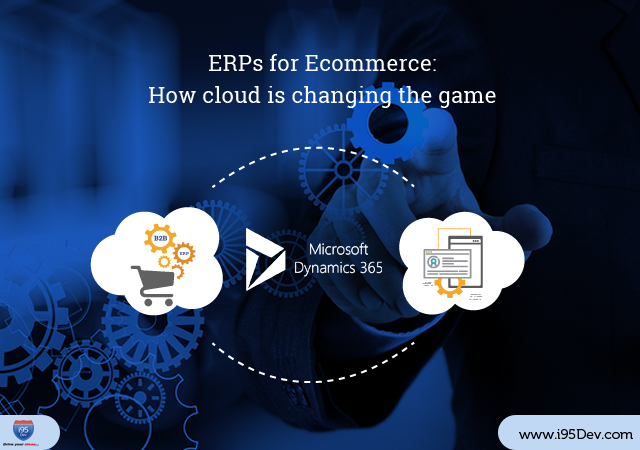ERP is the first thing a growing eCommerce business thinks. While the choice is myriad, it is never easy to zero in on an ERP for ecommerce and it is a rather tricky disposition. There are numerous ERPs like Microsoft Dynamics AX, NAV, GP, 365, SAP B1 and Sage 100 for ecommerce in the market. Ecommerce businesses should watch out for the developments in the cloud ERP space.
ERP products are rapidly evolving. This changes the way businesses operate and the pace with which operations run. In this article, we aim to throw light on how innovation is beginning to change the course of ERP landscape and the trends to watch out.
-
- Stay on top with cloud ERP for ecommerce
Most ecommerce companies opt for on premise ERP solutions. This is not bad given the freedom of maintaining in house factors like server upkeep, maintenance and backup. However, there is a reversal in this trend, which will only grow stronger in the future.The ERP systems are moving into the cloud and this is a huge advantage for ecommerce companies. On a cloud model, they need not bother about the upkeep, maintenance and disaster recovery, as these are taken care by the service providers. This would leave ample scope for the businesses to work on what they do best. Further. Ecommerce companies need not maintain huge IT teams to maintain their infrastructure.
- Taking the mixed ERP route
There are many businesses, who operate on an on-premise ERP. There is no urgent need to adopt a cloud ERP solution right away. These companies have the option of working with the ERP vendors to opt for a mixed ERP model.If the company’s on premise ERP is working fine, the only thing they can add the additional modules as needed, such as CRM and Business intelligence. This can be done without purchasing additional hardware but rather, plugging in SaaS modules on top the existing on premise ERP. This trend is becoming increasingly popular.
The benefit of this model is instead of changing the whole on premise system, they can experiment with verticals and slices of their businesses by deploying SaaS ERP to determine how they work with the existing systems.
- Stay on top with cloud ERP for ecommerce
- Rapid scope for instant innovation
With the advent of cloud ERP solutions, the time taken to implement an ERP solution drastically reduced. The interfaces of ERP have become cleaner, accurate and scalable. The reason being able to access ERP interfaces through mobiles and tablets that gives ease of assessing information on the go.Social media integration with ERP is another such innovation which is a very important aspect for any business. This allows company to connect to their target audience quickly, identify trends and customer sentiments in real time. Analyzing the social trends is now easier. Also, integrating social media with ERP helps them gauge customer sentiments to strategize and effectively capture their social audience.
- Enhancing security measures
Security is a very crucial aspect in an ecommerce operation and any slight fallacy in this part would lead to repercussions of humongous proportions. Take the example of ecommerce businesses where sensitive financial details are captured. With evolution of technology, the techniques to breach and phish, the financial details of customers are possible today.With the advent of SaaS ERP solutions, ecommerce companies can start playing safe (in terms of data loss) by transferring all the data into their cloud. Cloud hosting provides 24/7 advanced security (like Nexcess), which provides robust data protection to your data. The companies access to the central panel and 24/7 support allows any issue to be resolved quicker than a traditional ERP solution.
- Internet of things
In this age of connectivity, the term IoT (Internet of things) has only raised the bar a bit higher. It is a matter of time before it shows profound effects on how ERP works. The goal of an ERP is to provide actionable data for the running of a business but getting that data is a challenge.Internet of things has the potential to massively expand data availability which has significant implications on customer service, forecasting, inventory management and BI.
As gadgets with embedded software increase, the demand for information increases. This changes the information flows in the ERP. With distributed network, cloud ERPs can better handle a network with such systems in place.
Internet of things concept is a relatively new trend that is set to change the way ERP functions.
Conclusion
No two businesses are same, even if they are operating under the same niche, and this is our expertise identifying the requirements of an ecommerce business and going a step further in helping them with our team of experts. We combine the power of Magento and the best ERP solutions available in the industry that is the Microsoft Dynamics 365 (in addition to AX, GP, NAV, Sage 100 and SAP B1) to give an optimized and tailor-made solution.
We are a leading ecommerce service providers based out of United States of America and we deal in providing customized ecommerce ERP integration solutions to businesses based on their operational needs and requirements.
If you are an ecommerce business looking to gain a competitive foothold in your niche and area of operation and planning to gain a head start over your competition, contact us.





